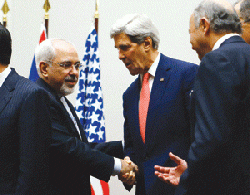Washington – Americans back a newly brokered nuclear deal with Iran by a 2-to-1 margin and are very wary of the United States resorting to military action against Tehran even if the historic diplomatic effort falls through, a Reuters/Ipsos poll showed on Tuesday.
The findings were rare good news in the polls for President Barack Obama, whose approval ratings have dropped in recent weeks because of the botched rollout of his signature healthcare reform law.
According to the Reuters/Ipsos survey, 44 percent of Americans support the interim deal reached between Iran and six world powers in Geneva last weekend, and 22 percent oppose it.
While indicating little trust among Americans toward Iranian intentions, the survey also underscored a strong desire to avoid new U.S. military entanglements after long, costly wars in Iraq and Afghanistan.
Even if the Iran deal fails, 49 percent want the United States to then increase sanctions and 31 percent think it should launch further diplomacy. But only 20 percent want U.S. military force to be used against Iran.
But contrary to public opinion, senators have been discussing for months imposing even tighter Iran sanctions, which could anger Tehran and put Sunday’s interim deal reached in Geneva in jeopardy. And pro-Israel lobbying organizations – among the most effective interest groups in Washington – have failed so far to persuade lawmakers to tighten the sanctions screw on Iran.
The agreement does not need to be ratified by Congress and Obama is using his executive power to temporarily suspend some existing U.S. sanctions on Iran.
The deal halts Iran’s progress on its nuclear program, including construction of the Arak research reactor. It will neutralize Iran’s stockpile of uranium refined to a fissile concentration of 20 percent, which is close to the level needed for weapons, allow increased U.N. nuclear inspections, and halt uranium enrichment over a fissile purity of 5 percent.
In return the accord grants about $7 billion in potential relief from sanctions. It will allow a potential access to $1.5 billion in trade in gold and precious metals and the suspension of some sanctions on Iran’s auto sector and petrochemical exports, and also give Iran access to some $4.2 billion in sales from its reduced oil exports.






Leave a Reply